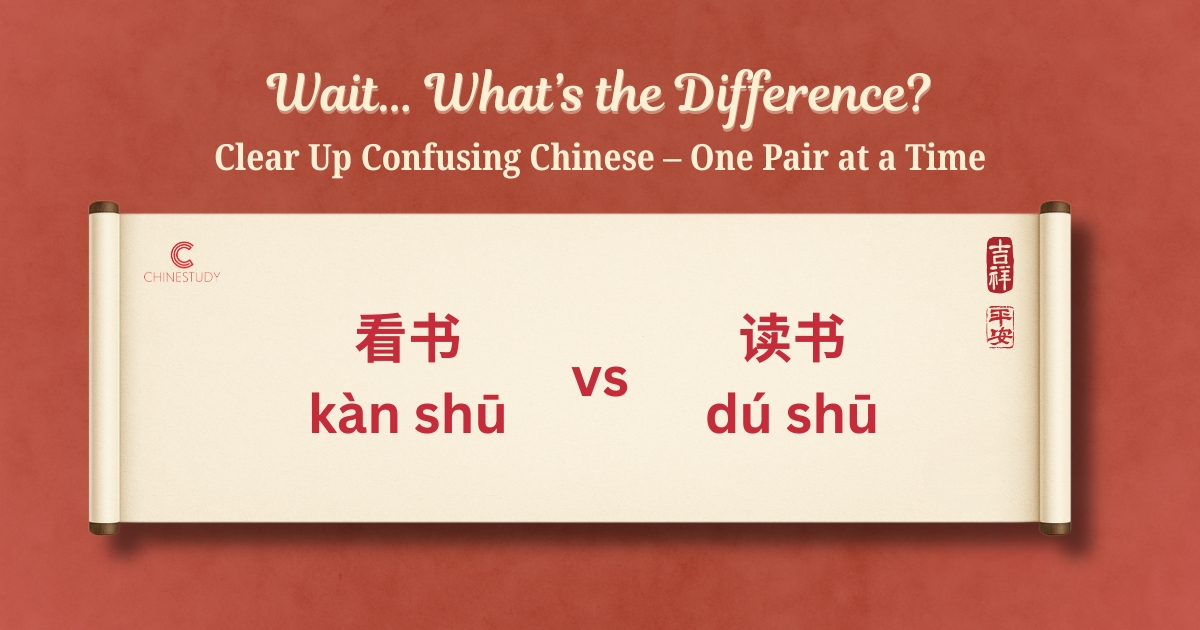🧐 看书 kàn shū vs 读书 dú shū – What’s the Difference?

Both can mean “reading a book,” right? But in Chinese, 看书 and 读书 are not exactly the same!
Let’s look at how to use each one correctly. 👀📚
🔍 Breakdown
🟠 看书 (kàn shū) – to look at or casually read a book
- Used when you read for fun, for interest, or to relax
- Often means “look at a book” (like picture books, novels, etc.)
- ✅ Common in spoken Chinese
🟢 读书 (dú shū) – to read books / to study
- Used when talking about serious reading or studying
- Can also mean “attend school” or “pursue education”
- ✅ More formal – often used in written Chinese, speeches, or academic settings
💡 Tip: In daily conversation, you’ll hear 看书 more often. In formal or written contexts, 读书 is preferred.
💬 Easy Examples
✅ 看书 (kàn shū) – reading casually
Example 1:
- 我喜欢在晚上看书。
- Wǒ xǐhuan zài wǎnshang kàn shū.
- 👉 I like to read books at night.
- 📝 Casual, relaxing reading.
Example 2:
- 他在看一本小说。
- Tā zài kàn yì běn xiǎoshuō.
- 👉 He’s reading a novel.
- 📝 Light or fun reading.
Example 3:
- 小朋友在看图画书。
- Xiǎo péngyou zài kàn túhuàshū.
- 👉 The child is reading a picture book.
- 📝 Flipping through or looking at pictures.
✅ 读书 (dú shū) – studying or reading seriously
Example 1:
- 他正在读书,别打扰他。
- Tā zhèngzài dúshū, bié dǎrǎo tā.
- 👉 He’s studying/reading, don’t bother him.
- 📝 Studying with focus.
Example 2:
- 我每天早上读半小时的英文书。
- Wǒ měitiān zǎoshang dú bàn xiǎoshí de Yīngwén shū.
- 👉 I read English books for half an hour every morning.
- 📝 Regular, structured reading.
Example 3:
- 他在北京大学读书。
- Tā zài Běijīng Dàxué dúshū.
- 👉 He is studying at Peking University.
- 📝 “读书” = attending school.
🎯 Interactive Practice
Choose the better word: 看书 (kàn shū) or 读书 (dúshū)
1. 周末我喜欢 ______,很放松。(Zhōumò wǒ xǐhuan ______, hěn fàngsōng.)
- 👉 On weekends, I like reading; it’s relaxing.
- ✅ The better answer: 看书 (kàn shū) - 🎯 Reading for fun.
2. 她在图书馆 ______, 准备期末考试。(Tā zài túshūguǎn ______, zhǔnbèi qīmò kǎoshì.)
- 👉 She’s studying in the library for finals.
- ✅ The better answer: 读书 (dúshū) - 🎯 Focused academic reading.
3. 那个小孩在 ______ 图画书。(Nà ge xiǎohái zài ______ túhuàshū.)
- 👉 That child is looking at a picture book.
- ✅ The better answer: 看 (kàn) - 🎯 Looking at illustrations.
4. 他在北京大学 ______。(Tā zài Běijīng Dàxué ______.)
- 👉 He is studying at Peking University.
- ✅ The better answer: 读书 (dúshū) - 🎯 Use 读书 to mean “attend school.”
🚀 Final Tip
- 📌 看书 (kàn shū) – commonly used in spoken Chinese for casual reading, like novels, comics, or picture books.
- 📌 读书 (dú shū) – often used in formal or written contexts, especially when talking about studying, school, or academic reading.
✍️ Try making two sentences:
- one using 看书 in a casual, daily-life situation
- one using 读书 in a more formal or academic context
Practice makes progress! 加油!💪
👉 Think this was tricky? More word pairs are waiting to mess with your brain — check them out here! 😄📘
Thank you for subscribing!
Have a great day!